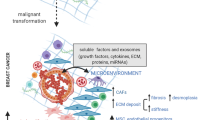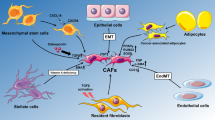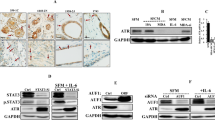Abstract
Purpose
It has been reported that stromal cell features may affect the clinical outcome of breast cancer patients. Cancer associated fibroblasts (CAFs) represent one of the most abundant cell types within the breast cancer stroma. Here, we aimed to explore the influence of CAFs on breast cancer gene expression, as well as on invasion and angiogenesis.
Methods
qRT-PCR was used to evaluate the expression of several cancer progression related genes (S100A4, TGFβ, FGF2, FGF7, PDGFA, PDGFB, VEGFA, IL-6, IL-8, uPA, MMP2, MMP9, MMP11 and TIMP1) in the human breast cancer-derived cell lines MCF-7 and MDA-MB-231, before and after co-culture with CAFs. Stromal mononuclear inflammatory cell (MIC) MMP11 expression was used to stratify primary tumors. In addition, we assessed the in vitro effects of CAFs on both MDA-MB-231 breast cancer cell invasion and endothelial cell (HUVEC) tube formation.
Results
We found that the expression levels of most of the genes tested were significantly increased in both breast cancer-derived cell lines after co-culture with CAFs from either MMP11+ or MMP11- MIC tumors. IL-6 and IL-8 showed an increased expression in both cancer-derived cell lines after co-culture with CAFs from MMP11+ MIC tumors. We also found that the invasive and angiogenic capacities of, respectively, MDA-MB-231 and HUVEC cells were increased after co-culture with CAFs, especially those from MMP11+ MIC tumors.
Conclusions
Our data indicate that tumor-derived CAFs can induce up-regulation of genes involved in breast cancer progression. Our data additionally indicate that CAFs, especially those derived from MMP11+ MIC tumors, can promote breast cancer cell invasion and angiogenesis.




Similar content being viewed by others
References
T. Marsh, K. Pietras, S.S. McAllister, Fibroblasts as architects of cancer pathogenesis. Biochim. Biophys. Acta 1832, 1070–1078 (2013)
I. Kogan-Sakin, M. Cohen, N. Paland, S. Madar, H. Solomon, A. Molchadsky, R. Brosh, Y. Buganim, N. Goldfinger, H. Klocker, J.A. Schalken, V. Rotter, Prostate stromal cells produce CXCL-1, CXCL-2, CXCL-3 and IL-8 in response to epithelia-secreted IL-1. Carcinogenesis 30, 698–705 (2009)
M.P. Protti, L. De Monte, Cross-talk within the tumor microenvironment mediates Th2-type inflammation in pancreatic cancer. Oncoimmunology. 1, 89–91 (2012)
S. Koontongkaew, The tumor microenvironment contribution to development, growth, invasion and metastasis of head and neck squamous cell carcinomas. J. Cancer 4, 66–83 (2013)
S. Madar, I. Goldstein, V. Rotter, ‘Cancer associated fibroblasts’--more than meets the eye. Trends Mol. Med. 19, 447–453 (2013)
N. Erez, M. Truitt, P. Olson, S.T. Arron, D. Hanahan, Cancer-associated fibroblasts are activated in incipient neoplasia to orchestrate tumor-promoting inflammation in an NF-kappaB-dependent manner. Cancer Cell 17, 135–147 (2010)
P.S. Soon, E. Kim, C.K. Pon, A.J. Gill, K. Moore, A.J. Spillane, D.E. Benn, R.C. Baxter, Breast cancer-associated fibroblasts induce epithelial-to-mesenchymal transition in breast cancer cells. Endocr. Relat. Cancer 20, 1–12 (2013)
R. Kalluri, M. Zeisberg, Fibroblasts in cancer. Nat. Rev. Cancer 6, 392–401 (2006)
M. Allen, J. Louise Jones, Jekyll and Hyde: the role of the microenvironment on the progression of cancer. J. Pathol. 223, 162–176 (2011)
L. Gonzalez, N. Eiro, B. Fernandez-Garcia, L.O. Gonzalez, F. Dominguez, F.J. Vizoso, Gene expression profile of normal and cancer-associated fibroblasts according to intratumoral inflammatory cells phenotype from breast cancer tissue. Mol. Carcinog. 55, 1489–1502 (2016)
M.M. Koczorowska, C. Friedemann, K. Geiger, M. Follo, M.L. Biniossek, O. Schilling, Differential effect of TGFbeta on the proteome of cancer associated fibroblasts and cancer epithelial cells in a co-culture approach - a short report. Cell. Oncol. 40, 639–650 (2017)
N. Eiro, B. Fernandez-Garcia, L.O. Gonzalez, F.J. Vizoso, Cytokines related to MMP-11 expression by inflammatory cells and breast cancer metastasis. Oncoimmunology. 2, e24010 (2013)
L.O. Gonzalez, I. Pidal, S. Junquera, M.D. Corte, J. Vazquez, J.C. Rodriguez, M.L. Lamelas, A.M. Merino, J.L. Garcia-Muniz, F.J. Vizoso, Overexpression of matrix metalloproteinases and their inhibitors in mononuclear inflammatory cells in breast cancer correlates with metastasis-relapse. Br. J. Cancer 97, 957–963 (2007)
N. Eiro, B. Fernandez-Garcia, J. Vazquez, J.M. Del Casar, L.O. Gonzalez, F.J. Vizoso, A phenotype from tumor stroma based on the expression of metalloproteases and their inhibitors, associated with prognosis in breast cancer. Oncoimmunology 4, e992222 (2015)
L.O. Gonzalez, S. Gonzalez-Reyes, L. Marin, L. Gonzalez, J.M. Gonzalez, M.L. Lamelas, A.M. Merino, E. Rodriguez, I. Pidal, J.M. del Casar, A. Andicoechea, F. Vizoso, Comparative analysis and clinical value of the expression of metalloproteases and their inhibitors by intratumour stromal mononuclear inflammatory cells and those at the invasive front of breast carcinomas. Histopathology 57, 862–876 (2010)
B. Fernandez-Garcia, N. Eiro, M.A. Miranda, S. Cid, L.O. Gonzalez, F. Dominguez, F.J. Vizoso, Prognostic significance of inflammatory factors expression by stroma from breast carcinomas. Carcinogenesis 37, 768–776 (2016)
E. Zudaire, L. Gambardella, C. Kurcz, S. Vermeren, A computational tool for quantitative analysis of vascular networks. PLoS One 6, e27385 (2011)
M.A. Taylor, Y.H. Lee, W.P. Schiemann, Role of TGF-beta and the tumor microenvironment during mammary tumorigenesis. Gene Expr. 15, 117–132 (2011)
B. Bierie, H.L. Moses, Tumour microenvironment: TGFbeta: the molecular Jekyll and Hyde of cancer. Nat. Rev. Cancer 6, 506–520 (2006)
A. Orimo, P.B. Gupta, D.C. Sgroi, F. Arenzana-Seisdedos, T. Delaunay, R. Naeem, V.J. Carey, A.L. Richardson, R.A. Weinberg, Stromal fibroblasts present in invasive human breast carcinomas promote tumor growth and angiogenesis through elevated SDF-1/CXCL12 secretion. Cell 121, 335–348 (2005)
A.W. Studebaker, G. Storci, J.L. Werbeck, P. Sansone, A.K. Sasser, S. Tavolari, T. Huang, M.W. Chan, F.C. Marini, T.J. Rosol, M. Bonafe, B.M. Hall, Fibroblasts isolated from common sites of breast cancer metastasis enhance cancer cell growth rates and invasiveness in an interleukin-6-dependent manner. Cancer Res. 68, 9087–9095 (2008)
J.M. Wang, X. Deng, W. Gong, S. Su, Chemokines and their role in tumor growth and metastasis. J. Immunol. Methods 220, 1–17 (1998)
D.E. Hu, Y. Hori, T.P. Fan, Interleukin-8 stimulates angiogenesis in rats. Inflammation 17, 135–143 (1993)
T. Bachelot, I. Ray-Coquard, C. Menetrier-Caux, M. Rastkha, A. Duc, J.Y. Blay, Prognostic value of serum levels of interleukin 6 and of serum and plasma levels of vascular endothelial growth factor in hormone-refractory metastatic breast cancer patients. Br. J. Cancer 88, 1721–1726 (2003)
R. Salgado, S. Junius, I. Benoy, P. Van Dam, P. Vermeulen, E. Van Marck, P. Huget, L.Y. Dirix, Circulating interleukin-6 predicts survival in patients with metastatic breast cancer. Int. J. Cancer 103, 642–646 (2003)
I.H. Benoy, R. Salgado, P. Van Dam, K. Geboers, E. Van Marck, S. Scharpe, P.B. Vermeulen, L.Y. Dirix, Increased serum interleukin-8 in patients with early and metastatic breast cancer correlates with early dissemination and survival. Clin. Cancer Res. 10, 7157–7162 (2004)
Y. Cao, Multifarious functions of PDGFs and PDGFRs in tumor growth and metastasis. Trends Mol. Med. 19, 460–473 (2013)
M. Jechlinger, A. Sommer, R. Moriggl, P. Seither, N. Kraut, P. Capodiecci, M. Donovan, C. Cordon-Cardo, H. Beug, S. Grunert, Autocrine PDGFR signaling promotes mammary cancer metastasis. J. Clin. Invest. 116, 1561–1570 (2006)
M.M. Mueller, N.E. Fusenig, Friends or foes - bipolar effects of the tumour stroma in cancer. Nat. Rev. Cancer 4, 839–849 (2004)
D. Engelmann, D. Mayoli-Nussle, C. Mayrhofer, K. Furst, V. Alla, A. Stoll, A. Spitschak, K. Abshagen, B. Vollmar, S. Ran, B.M. Putzer, E2F1 promotes angiogenesis through the VEGF-C/VEGFR-3 axis in a feedback loop for cooperative induction of PDGF-B. J. Mol. Cell Biol. 5, 391–403 (2013)
P. Manders, L.V. Beex, V.C. Tjan-Heijnen, J. Geurts-Moespot, T.H. Van Tienoven, J.A. Foekens, C.G. Sweep, The prognostic value of vascular endothelial growth factor in 574 node-negative breast cancer patients who did not receive adjuvant systemic therapy. Br. J. Cancer 87, 772–778 (2002)
H. Bando, H.A. Weich, M. Brokelmann, S. Horiguchi, N. Funata, T. Ogawa, M. Toi, Association between intratumoral free and total VEGF, soluble VEGFR-1, VEGFR-2 and prognosis in breast cancer. Br. J. Cancer 92, 553–561 (2005)
S. Ghosh, C.A. Sullivan, M.P. Zerkowski, A.M. Molinaro, D.L. Rimm, R.L. Camp, G.G. Chung, High levels of vascular endothelial growth factor and its receptors (VEGFR-1, VEGFR-2, neuropilin-1) are associated with worse outcome in breast cancer. Hum. Pathol. 39, 1835–1843 (2008)
S.O. Wurtz, A.S. Schrohl, N.M. Sorensen, U. Lademann, I.J. Christensen, H. Mouridsen, N. Brunner, Tissue inhibitor of metalloproteinases-1 in breast cancer. Endocr. Relat. Cancer 12, 215–227 (2005)
A. Neri, T. Megha, F. Bettarini, D. Tacchini, M.G. Mastrogiulio, D. Marrelli, E. Pinto, P. Tosi, Is tissue inhibitor of metalloproteinase-1 a new prognosticator for breast cancer? An analysis of 266 cases. Hum. Pathol. 43, 1184–1191 (2012)
A. Dechaphunkul, M. Phukaoloun, K. Kanjanapradit, K. Graham, S. Ghosh, C. Santos, J.R. Mackey, Prognostic significance of tissue inhibitor of metalloproteinase-1 in breast cancer. Int. J. Breast Cancer 2012, 290854 (2012)
N. Eiro, L. Gonzalez, L.O. Gonzalez, B. Fernandez-Garcia, M.L. Lamelas, L. Marin, S. Gonzalez-Reyes, J.M. del Casar, F.J. Vizoso, Relationship between the inflammatory molecular profile of breast carcinomas and distant metastasis development. PLoS One 7, e49047 (2012)
N. Eiro, I. Pidal, B. Fernandez-Garcia, S. Junquera, M.L. Lamelas, J.M. del Casar, L.O. Gonzalez, A. Lopez-Muniz, F.J. Vizoso, Impact of CD68/(CD3+CD20) ratio at the invasive front of primary tumors on distant metastasis development in breast cancer. PLoS One 7, e52796 (2012)
Y. Lin, R. Huang, L. Chen, S. Li, Q. Shi, C. Jordan, R.P. Huang, Identification of interleukin-8 as estrogen receptor-regulated factor involved in breast cancer invasion and angiogenesis by protein arrays. Int. J. Cancer 109, 507–515 (2004)
R.K. Jain, Molecular regulation of vessel maturation. Nat. Med. 9, 685–693 (2003)
Acknowledgments
This work was supported by grants to F. V from the Instituto de Salud Carlos III (PI13/02745) and from the Consejería de Economía y Empleo del Principado de Asturias (GRUPIN14-116), and to R.P-F. from the Ministerio de Economia y Competividad (SAF2015-69221-R). A.M-O. is a predoctoral fellow from the Ministerio de Educación (FPU14/00548). S.C. was recipient of a predoctoral fellowship financed by the Gobierno del Principado de Asturias “Severo Ochoa” PhD Program (BP14-128).
Author information
Authors and Affiliations
Corresponding authors
Ethics declarations
The study adheres to national regulations and was approved by our Institution’s Ethics and Investigation Committee.
Conflict of interest
The authors have no conflicts of interests to disclose.
Rights and permissions
About this article
Cite this article
Eiro, N., González, L., Martínez-Ordoñez, A. et al. Cancer-associated fibroblasts affect breast cancer cell gene expression, invasion and angiogenesis. Cell Oncol. 41, 369–378 (2018). https://doi.org/10.1007/s13402-018-0371-y
Accepted:
Published:
Issue Date:
DOI: https://doi.org/10.1007/s13402-018-0371-y




